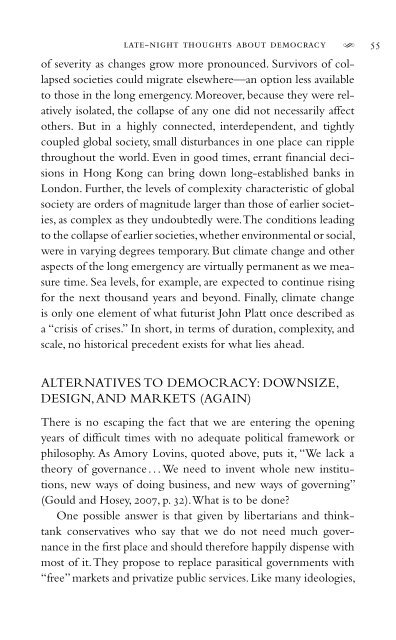Down to the wire : confronting climate collapse / David - Index of
Down to the wire : confronting climate collapse / David - Index of
Down to the wire : confronting climate collapse / David - Index of
Create successful ePaper yourself
Turn your PDF publications into a flip-book with our unique Google optimized e-Paper software.
late-night thoughts about democracy S 55<br />
<strong>of</strong> severity as changes grow more pronounced. Survivors <strong>of</strong> <strong>collapse</strong>d<br />
societies could migrate elsewhere—an option less available<br />
<strong>to</strong> those in <strong>the</strong> long emergency. Moreover, because <strong>the</strong>y were relatively<br />
isolated, <strong>the</strong> <strong>collapse</strong> <strong>of</strong> any one did not necessarily affect<br />
o<strong>the</strong>rs. But in a highly connected, interdependent, and tightly<br />
coupled global society, small disturbances in one place can ripple<br />
throughout <strong>the</strong> world. Even in good times, errant fi nancial decisions<br />
in Hong Kong can bring down long-established banks in<br />
London. Fur<strong>the</strong>r, <strong>the</strong> levels <strong>of</strong> complexity characteristic <strong>of</strong> global<br />
society are orders <strong>of</strong> magnitude larger than those <strong>of</strong> earlier societies,<br />
as complex as <strong>the</strong>y undoubtedly were. The conditions leading<br />
<strong>to</strong> <strong>the</strong> <strong>collapse</strong> <strong>of</strong> earlier societies, whe<strong>the</strong>r environmental or social,<br />
were in varying degrees temporary. But <strong>climate</strong> change and o<strong>the</strong>r<br />
aspects <strong>of</strong> <strong>the</strong> long emergency are virtually permanent as we measure<br />
time. Sea levels, for example, are expected <strong>to</strong> continue rising<br />
for <strong>the</strong> next thousand years and beyond. Finally, <strong>climate</strong> change<br />
is only one element <strong>of</strong> what futurist John Platt once described as<br />
a “crisis <strong>of</strong> crises.” In short, in terms <strong>of</strong> duration, complexity, and<br />
scale, no his<strong>to</strong>rical precedent exists for what lies ahead.<br />
ALTERNATIVES TO DEMOCRACY: DOWNSIZE,<br />
DESIGN, AND MARKETS (AGAIN)<br />
There is no escaping <strong>the</strong> fact that we are entering <strong>the</strong> opening<br />
years <strong>of</strong> diffi cult times with no adequate political framework or<br />
philosophy. As Amory Lovins, quoted above, puts it, “We lack a<br />
<strong>the</strong>ory <strong>of</strong> governance . . . We need <strong>to</strong> invent whole new institutions,<br />
new ways <strong>of</strong> doing business, and new ways <strong>of</strong> governing”<br />
(Gould and Hosey, 2007, p. 32). What is <strong>to</strong> be done?<br />
One possible answer is that given by libertarians and thinktank<br />
conservatives who say that we do not need much governance<br />
in <strong>the</strong> fi rst place and should <strong>the</strong>refore happily dispense with<br />
most <strong>of</strong> it. They propose <strong>to</strong> replace parasitical governments with<br />
“free” markets and privatize public services. Like many ideologies,
















